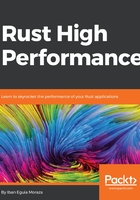
Asking the Rust compiler about performance
Rust sometimes has interesting and lesser-known features that really make a difference when talking about performance enhancements. When it comes to big improvements with small changes, the first thing that you should understand is the release mode. Rust by default compiles your software in development mode, which is pretty good to check for compiling errors quickly, but if you want to run it, it will run slowly. This is due to the development mode not performing any optimizations. It will create object (machine) code directly related to the Rust code without optimizing it.
Rust makes use of the LLVM backend, which makes it easy to take advantage of its performance optimizations without having to develop all of these by themselves. They will only need to use LLVM intermediate representation. An intermediate language between Rust and assembly code that the LLVM compiler understands. While in development mode, no optimizations get performed by Rust or LLVM; enabling them is as easy as adding the --release flag to the cargo compilation. So, for example, if you were running your software by typing cargo run in the console, just by using cargo run --release it will compile with optimizations and run much, much faster. Usually, the gain is of more than one order of magnitude.